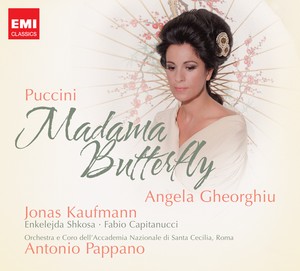|
|
|
|
|
|
|
|
| Classicalsource.com, Apr 14,
2009 |
| Alexander Campbell |
|
|
Madama Butterfly [Gheorghiu, Kaufmann, Pappano]
|
|
 A
new "Madama Butterfly" has to pave its way in a field of strong recordings
boasting some of the most famous interpretations of the past, and it can be
hard for a newcomer to displace a favourite of the old guard. That the list
of past Butterfly assumptions contains names such as Maria Callas, Renata
Tebaldi, Victoria de los Angeles, Renata Scotto and Mirella Freni cannot but
put pressure on any diva wishing to join this company. In her previous
Puccini recordings Angela Gheorghiu has shown that her vocal qualities and
her technical control are particularly suited to this composer.
Interestingly, she has said that Butterfly is not a role she would essay in
a staged production; a shame as this is an impressive performance. A
new "Madama Butterfly" has to pave its way in a field of strong recordings
boasting some of the most famous interpretations of the past, and it can be
hard for a newcomer to displace a favourite of the old guard. That the list
of past Butterfly assumptions contains names such as Maria Callas, Renata
Tebaldi, Victoria de los Angeles, Renata Scotto and Mirella Freni cannot but
put pressure on any diva wishing to join this company. In her previous
Puccini recordings Angela Gheorghiu has shown that her vocal qualities and
her technical control are particularly suited to this composer.
Interestingly, she has said that Butterfly is not a role she would essay in
a staged production; a shame as this is an impressive performance.
Gheorghiu's voice is extremely beautiful, full of colour with amazing
dynamic control. She just about manages to be convincingly naïve and
youthful-sounding throughout Act One, but beyond she rightly recognises that
the Butterfly of the second half is still only eighteen-years-old, only
slightly more mature emotionally. In Act Two her performance takes fire and
she manages to chart unerringly Butterfly's gradual disillusionment and
desperate response. In the first act the interpretation is less individual
than some, but that is fitting in that it brings the later tragedy into
greater contrast. One needs to listen more than once to really appreciate
this. For recording purposes Gheorghiu sounds to have the heft for the big
moments such as 'Un bel di, vedremo', and she handles the mercurial changes
of mood in her dealings with Susuki, and then Sharpless, early in Act Two
well.
Antionio Pappano and the excellent Santa Cecilia Orchestra offer her strong
and sympathetic support with atmospheric, spacious and clear playing. The
moments where there is the need to balance off-stage voices with the
orchestra are well-handled. Pappano, ever singer-friendly, conducts an
exciting and theatrical account of the score, relishing the big Romantic
moments without them sounding over-charged or hackneyed, and raising and
then maintaining the tension of the second act.
Jonas Kaufmann is interesting casting as Pinkerton. His voice has not the
open-throated unmistakeably Italianate sound of Luciano Pavarotti or Carlo
Bergonzi, nor their inherent 'smile in the voice'. The necessary Italianata
is there in abundance, but he has darker colours in the voice which have the
effect of making this Pinkerton seem less arrogant and crass than usual, and
ultimately as much of a victim of his own natural, yet unthinking, charm and
emotional immaturity. The love-duet is pretty heady stuff and credible as
these two young people abandon themselves to love or, in his case, lust,
whilst not really understanding each other's true nature. Kaufmann's vocal
acting in Pinkerton's reaction to the discovery of a child and the horror of
his situation is convincing. This is one of the very individual and
intelligent accounts of this role committed to disc.
The part of Suzuki can be a tricky one to pull off; in a performance one can
rely much on a baleful presence and body-language to depict the servant's
fierce loyalty to her young mistress as well as her wariness of Pinkerton
and all he represents, even in Act One where she does not get much to sing.
In purely aural terms it is harder to make this impression. Enkelejda Shkosa
makes much of the text, blends well with Gheorghiu in the 'Flower Duet', and
certainly makes a vital contribution in the short scene where she turns on
Goro. Fabio Capitanucci is a sympathetic and young-sounding Sharpless,
unwittingly entangled in an impossible situation and not handling it very
effectively. He has a warm and characterful baritone, though not a
particularly individual one. In the smaller roles there is an effective
Goro, and a steely if slightly rough-sounding Bonze from Raymond Aceto. The
Kate Pinkerton is unexceptional.
This is an account of "Madama Butterfly" that can hold its head up high in
the recorded company that it joins. Fans of the principal singers need not
hesitate, and Pappano's conducting on its own terms is a very good reason to
hear this recording. Those with strong attachments to older versions may
find much to challenge them. |
|
|
|
|
|
|
|
|
|
|
|
|
|
|
|
|
|
|